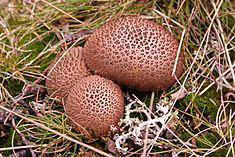Umber-brown puffball facts for kids
Quick facts for kids Lycoperdon umbrinum |
|
|---|---|
 |
|
| Lycoperdon umbrinum, found in Gala (Norway) in late August. | |
| Scientific classification | |
| Kingdom: | |
| Division: | |
| Class: | |
| Order: |
Agaricales
|
| Family: |
Agaricaceae
|
| Genus: |
Lycoperdon
|
| Species: |
L. umbrinum
|
| Binomial name | |
| Lycoperdon umbrinum Pers. (1801)
|
|
| Lycoperdon umbrinum | |
|---|---|
| Mycological characteristics | |
| glebal hymenium | |
| no distinct cap | |
| hymenium attachment is irregular or not applicable | |
| lacks a stipe | |
| spore print is olive | |
| ecology is saprotrophic | |
| edibility: edible | |
The Lycoperdon umbrinum, also known as the umber-brown puffball, is a type of puffball mushroom. It belongs to the Lycoperdon group of fungi. You can find this mushroom in different parts of the world, including China, Europe, and North America.
What Does It Look Like?
The main part of the umber-brown puffball, called its fruiting body, looks a bit like a pear. It has a short stem, or stipe, that is often partly hidden in the ground.
This mushroom usually grows to be about 2 to 5 centimeters (1 to 2 inches) tall. It is also around 1 to 4 centimeters (0.4 to 1.6 inches) wide.
Colors and Texture
When it first starts growing, the puffball is pale. As it gets older, its color changes. It turns reddish, and then finally becomes a dark blackish-brown.
The outside of the mushroom has thin, pointy spines. These spines can be up to 1 millimeter long and stay on the mushroom as it grows.
Tiny Spores
Inside the puffball are its spores. Spores are like tiny seeds that help the mushroom reproduce. These spores are mostly round.
They are very small, about 3.5 to 5.5 micrometers (µm) across. To give you an idea, a micrometer is one-millionth of a meter! The spores also have small bumps, like tiny warts, and a short stalk called a pedicel.
Where Does It Grow?
The umber-brown puffball is not a very common mushroom to find. However, when it is found, it usually grows in coniferous forests. These are forests with trees like pine, spruce, and fir. It prefers to grow in sandy soil within these woods.
Related pages

